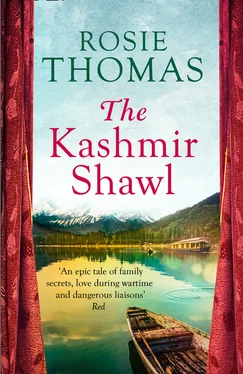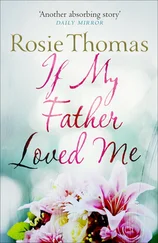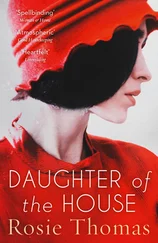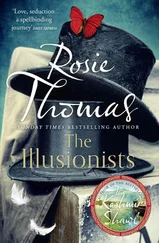1 ...8 9 10 12 13 14 ...22 Homesickness closed on her, unexpected but as tight as a clenched fist. She experienced a moment’s confused longing to be back in the valley. She could see her father at the kitchen table, his head bent over his newspaper and the inevitable cup of tea at his elbow.
She steadied herself by looking towards the white battlements of the Himalayas and the clouds that mounted above them. Evan and Nerys Watkins might well have stood in this same spot and gazed at the same view. Nerys must sometimes have been painfully homesick too, and it would have been further to travel then, and much harder for her to communicate with the people she had left behind. For the first time since she had come to India, Mair felt emotionally connected to her grandmother.
She walked slowly on until she had completed a circuit of the enclosure. It was disappointing, but there was nothing except the three or four Welsh names on gravestones. She was about to cross to the hut, where Tsering and his uncle were huddled out of the wind smoking bidis, when she noticed a plaque set into a wall.
She read:
In Memoriam
Matthew Alexander Forbes, St John’s College, Cambridge Lost on Nanga Parbat, August 1938, aged 22
Mair wasn’t sure what or where Nanga Parbat was, but she guessed it was a mountain. Twenty-two was very young.
‘How are you, ma’am?’ Tsering was calling to her. ‘Did you find something?’
She shook her head. ‘From the names there are some Welsh buried here, but there’s nothing to connect them to my family.’
Sonam turned his head and studied her. He looked so old, but he was as alert as his great-nephew. He muttered a question and Tsering shrugged and translated for her: ‘He says, why not say first that you are interested in the Welsh people?’
Mair blinked.
Sonam stood up and gestured over the wall. She nodded agreement and he led the way out of the cemetery and down a lane that meandered behind it, with Mair and Tsering doing their best to keep up. She hadn’t explored this quarter of the old town, and she looked with sad interest at crumbling stone walls and gaping potholes. The old buildings were mostly sinking into dereliction. A woman carrying a bundle of kindling on her head greeted Sonam as he sped by.
The lane petered out at a blank wall flanked by two abandoned buildings. One was of plain stone with tall windows veiled in layers of ancient dust, and it struck Mair at once that in its absolute lack of pretension it resembled a Welsh chapel. The one opposite was no more than a wall with a collapsing door in it, but at Sonam’s nod Tsering pushed open the door. It gave on to a little paved courtyard surrounded by single-storey buildings. Weeds and saplings tilted the old paving stones, and all the glass in the small-paned windows had gone. A pair of starved dogs appeared in a dark doorway and gave them a yellow-eyed glare.
Tsering and Sonam consulted.
‘This is old mission, with school and medical clinic, my uncle remembers well. Across there, that was Welsh church. Then it became Hindu temple, but now there is new one built by them. These days, nothing here.’ He gave a shrug without a glimmer of optimism in it. Mair had noticed a similar gesture too often during her conversations in Leh.
Sonam was nodding harder, waving at her to indicate that she should feel free to explore this desolate place.
Avoiding the dogs, she peered into the tiny rooms. The first two were empty, except for weeds poking up through the floors, scattered refuse and torn sacks, but in the third lay some rotten sticks of furniture. One piece was just recognisable as a schoolroom chair, with a small shelf on the back for books. There had been chairs quite similar to this one in the infants’ class at her own school. Mair bent and tried to set it upright but the shelf came away in her hands. At her feet lay the remains of a book, a sad remnant with swollen covers that had been half protected from the damp and cold by the shelf. She picked it up and looked at the ruined pages, and out of the pulpy grey mass two or three words were just distinguishable.
It was a Welsh hymnal.
Mair lifted her head. She had half thought that the two men might have been trying to please her with a visit to a compound that could have belonged to any of the various missions to Ladakh, or might not have had any missionary connection at all. But now she knew for sure.
Seventy years ago Evan Watkins would have preached in the chapel across the lane, and his wife must have tried to teach the children, perhaps in this very room. She tilted her head to listen, as if she could catch the sound of their voices, but all she could hear was dogs barking and the screech and hoot of distant traffic.
‘This is what I wanted to find,’ she said quietly, to her companions. After a moment she stooped and replaced the hymnal in its resting place.
The three of them retreated into the fresh air. Sonam took hold of Mair’s arm. He began to talk with great animation, words pouring out of him as he shook her elbow and peered up into her face. He had no teeth and his face was crosshatched with deep lines, but he suddenly looked much younger than his age.
‘Tell me what he’s saying?’ she begged Tsering.
‘He remembers the teacher here, when he was small boy. She was nice. She gave the children apples and they sang songs.’
Nerys Watkins, who had followed her husband to India and brought back the wedding shawl with a lock of hair hidden in its folds.
‘That might have been my grandmother. Does he remember her name? What songs did they sing?’
The shake of the old man’s head was enough of an answer, but another rush of words immediately followed. His hands measured out a chunk of the air and he grinned as he pretended to totter under the weight of it. Remembering the long-ago was a pleasure for him, she understood, just as it had become for her father. Tsering patted his uncle on the shoulder, telling him to slow down.
‘He says there was a wireless here, the first one my uncle had ever listened to. He liked the music that came out of it. The wireless was this big, and heavy. It had a battery, and it needed four men and a cart to take that battery all the way down to the river to be charged at the generator. Then the people would come in close and listen with serious faces. The children wanted to laugh, but it was not allowed. That was when there was the war in Europe, and then it came to Asia.’
Evan and Nerys, listening sombrely to the radio news in one of these low rooms, with the oil lamp throwing their shadows on the wall. She could see them so clearly now, at last: Evan in his preacher’s black, and Nerys with an apron covering her plain skirt and hand-knitted jersey.
‘Yes.’ She nodded. ‘That was when it was.’
There was nothing more to see in the abandoned compound. Tsering was interested and he made another circuit with her, looking through every doorway, but they made no further discoveries. After his flash of recollection Sonam seemed weary, all his energy spent. Mair gently put her hand on his shoulder. ‘Thank you. I’m glad to have come here.’
They made their way back down the lane, Sonam walking much more slowly and with his great-nephew’s support. The twilight was deepening and lights shone out of the windows of houses nearer to the cemetery until there was a blink, then another, and the power failed. The single street lamp in the distance went out. Mair and her companions halted under the navy-blue sky as Tsering searched an inner pocket for a flashlight. The old man put out a hand to Mair to steady himself, and she took his arm. Linked together, with the thin torch-beam picking out the deep holes and collapsed walls in their path, they stepped carefully onwards to the road.
At the junction where she turned off towards her hotel, she said goodbye to the two men. The money she gave Sonam disappeared in a flash into a slit in his tunic. He grasped her by the wrist and angled his head to peer at her in the gloom. Tsering translated for the last time.
Читать дальше












